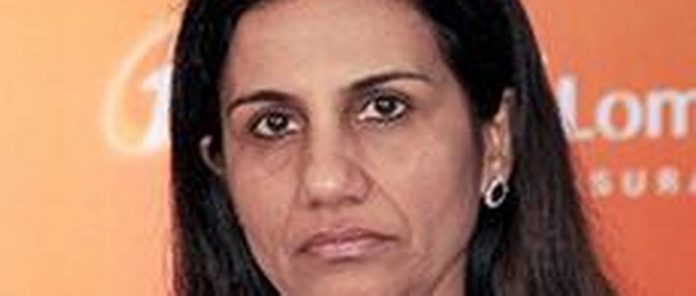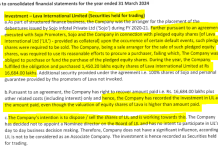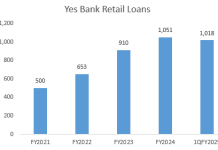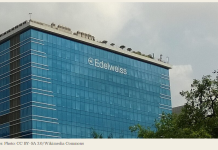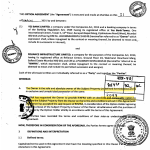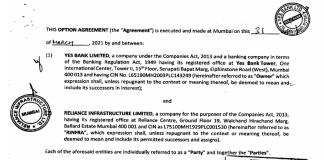If Chanda Kochhar had disclosed her husband’s dealings and recused herself from the credit committee that sanctioned the Videocon loan, her personal integrity would not be under question right now.

Credit: Reuters

Hemindra HazariBANKING02/APR/2018
ICICI Bank chairman M.K. Sharma displayed utter contempt for the media and public by calling for a press conference, merely reiterating the bank’s statement that was put out the previous day, and promptly departing without addressing a single question from the media.
On the morning of the press conference, March 29, 2018, the Indian Express ran a front-page story (the details of which largely match a blogpost put out by whistleblower investor Arvind Gupta in 2016) of the conflict of interest involving Chanda Kochhar, Chief Executive Officer (CEO) of ICICI Bank, and her husband, Deepak Kochhar.
The bank’s defence of Chanda Kochhar strangely begins from a 2012 rupee consortium loan of Rs 40,000 crores, where it argues it was one of the banks involved in taking an exposure on the Videocon group. It takes the safety of this 20-member consortium to shield itself for sanctioning the loan and for the account becoming non-performing (NPA).
ICICI Bank and the Videocon group have had a lengthy and continuous relationship since the 1990s (with erstwhile ICICI) and except for a brief period in 2004, the bank was a major financer to the group predating the consortium loan of 2012. The Videocon group had been limping for a long time, even before it applied for the consortium loan in 2012 and that is why according to a former senior ICICI Bank official, who spoke with this writer, the internal credit rating in ICICI Bank for the Videocon group never went higher than ‘BBB’.
Therefore, there was no urgency to have participated in the consortium which lent funds to the group, and to have even taken a rupee exposure of Rs 3,250 crores, apart from an undisclosed exposure on foreign exchange loans to the group. For ICICI Bank, the Videocon 2012 consortium rupee loan was significant as it was 5.6% of its standalone net worth in FY’2012 and hence required the full support of the CEO.
It is in this historical context that the conflict of interest of Chanda Kochhar has to be seen. She was appointed on the board of directors in 2001 and from 2007 till early 2009 was joint managing director (JMD) & chief financial officer (CFO). As an executive director and the heir apparent (appointed CEO on May 1, 2009), did she specifically disclose that her husband was a joint owner with Venugopal Dhoot of Videocon in Nupower Renewables when the company was established in December 2008?
M.K. Sharma, in his statement defending Chanda Kochhar’s presence on the credit committee meeting which evaluated the 2012 Videocon loan, said she was “part of the credit committee which sanctioned loans to the Videocon group and the board did not see this as a conflict of interest in any manner as the Videocon group was not the investor in NuPower Renewables and the board also saw nothing wrong with that and she has been making all the disclosures in accordance with the regulations under the Companies Act and the Banking Act.”
Interestingly, Sharma did not state whether Chanda Kochhar had specifically disclosed to the bank that her husband had a business relationship with the Dhoots. It appears that such a specific disclosure was not provided as ICICI Bank acknowledged that as “none of the investors of NuPower Renewables are [bold ours] borrowers of ICICI Bank” the conflict of interest did not arise.
It is pertinent that the statement does not state whether any past investors of NuPower Renewables were borrowers of ICICI Bank.
Proactive disclosures
Good corporate governance dictates that Chanda Kochhar as joint MD and later as the CEO should have disclosed that her husband had this relationship with the Dhoots and therefore should have recused herself from the credit committee that sanctioned the Videocon loan. If such an action was undertaken then and recorded in the resolution that was passed at the credit committee meeting which examined the Videocon sanction, her personal integrity would not have been questioned now and the responsibility of the Videocon loan would have been on the committee with her absence and reason thereof being on the record.
Chanda Kochhar’s conflict of interest gets aggravated as Videocon has been classified as non-performing by all the banks in 2017. And now the public becomes aware that ICICI Bank’s lending to a high-risk group may have been accompanied by inadequate disclosure of personal interest of the CEO. Such news erodes public confidence in a bank as it perceives dubious lending is a result of side deals being done to benefit the CEO and her immediate family.
ICICI Bank’s statement of no relationship between investors in NuPower Renewables and borrowers of the bank shows remarkable naiveté about the manner in which financial deals are normally disguised through shell companies, multiple transactions, offshore payments, different family members/related third parties participating in different transactions to disguise the nature of the deal, etc. are routinely employed. Here is a bank which in its earlier avatar of a financial institution solely focused on term lending to companies and as a bank emphasised capital expenditure and even clean loans to companies is pleading ignorance about how the Indian corporate sector functions with its labyrinth of companies. A fundamental principle of banking is to monitor the end use of funds and on this critical aspect, it is silent on how it monitored the Videocon group’s use of the loans taken from the bank.
By focusing on ICICI Bank being one of the many bankers in the Videocon consortium, its defence of its conduct is peculiar. Other banks lent, so its own non-application of mind is excusable despite ICICI Bank trading at a premium (on a price to book value ratio) in the stock market as compared with the government banks in the consortium. The other banks also need to be questioned. In ICICI’s case, clear conflict of interest adds an additional dimension.
Another issue which investigative agencies need to probe is the source of funding of the Videocon group’s investment into NuPower. If such an investigation reveals that the ultimate source was from Indian banks, it would show siphoning off funds and Chanda Kochhar’s conduct would come under greater scrutiny on account of her husband’s business interest with Videocon.
Despite the needle of suspicion pointing towards Chanda Kochhar, the board has put a protective cordon around her and absolved her of any wrong-doing with even the chairman issuing a statement reposing confidence in her leadership. Hence after such an overwhelming endorsement, it is unlikely that the board can even consider appointing external investigators to examine her conduct.
As ICICI Bank’s American depository receipt (ADR) trades on the New York Stock exchange, the Chanda Kochhar episode exposes it to class action suits which can be prohibitively expensive to the bank’s shareholders. Specialised American legal firms eagerly examine such conduct minutely and mobilise investors in US courts to get huge rewards at the cost to shareholders and depositors of concerned banks. The loss in confidence of foreign shareholders in ICICI Bank can result in a precipitous fall in the bank’s share price creating a crisis of confidence in the bank.
Since ICICI Bank is the second largest private sector bank by assets, and it deals with public funds, it is now incumbent on the regulator, the Reserve Bank of India (RBI), to step in and conduct a thorough investigation. As the controversy has become headline news and ICICI Bank’s explanation does not appear to resolve the issue, the damaged credibility of the bank’s CEO may rattle public confidence. A bank not owned by the sovereign, one which deals with public funds, and has liquid liabilities and less liquid assets, requires public confidence to remain in business.
In the past, ICICI Bank has proved particularly vulnerable to public perception and has the dubious track record of experiencing not one but two runs on its deposits in 2003 and 2008 under the leadership of Chanda Kochhar’s mentor, K.V. Kamath.
In the ongoing debate on privatisation of government banks, led within the government by Arvind Subramanian and outside by industrialists and media commentators, it is a mistake to assume that private sector banks have good governance standards and that as such privatisation would take care of governance. Wherever one finds poor standards, intervention is necessary by the regulator. Chanda Kochhar’s conduct at ICICI Bank, and that of CEOs at other private sector banks (here and here), reveals that corporate governance standards at private sector banks are pathetic.
Let the investigation run its course
The Central Bureau of Investigation (CBI) filed its preliminary enquiry (PE) last month into the nexus between Deepak Kochhar and Venugopal Dhoot and also mentioned “unnamed bank officials”. If the PE does result in a first information report (FIR), and if it implicates Deepak Kochhar, Chanda’s position at the bank will become difficult and the board’s defence of her inexcusable.
The broader issue of Chanda Kochhar’s conduct is the need to track family interests of senior officers and CEOs of all public sector and private sector banks. Is it a practice for them to fully disclose these interests to boards? Do boards make active inquiries?
For public sector banks, the Central Vigilance Commission (CVC) and Comptroller and Auditor General (CAG) are there; what of the private sector? The manner in which ICICI Bank has hurriedly endorsed Chanda Kochhar’s questionable conduct and with multiple state agencies probing the issue, it is time the CVC are mandated to monitor private sector banks as they deal with public funds with weak board oversight.
The business media and the 54 specialised banking analysts tracked by Bloomberg who cover ICICI Bank are no better. For two years, they deliberately ignored Arvind Gupta’s complaint, which was in the public domain, and the media preferred to ask soft questions to Chanda Kochhar in their exclusive interviews with her. It was only when the din in social media reached a crescendo that media hesitantly started covering it. In contrast, this writer has still to read any reports by the analysts (50 of whom have a ‘buy’ rating on the bank – only a single analyst maintains a ‘sell’ rating) since the story broke; for them, the story is irrelevant and not worthy of comment.
In this entire sordid episode, nobody comes out clean, least of all the regulators. The investor blew the whistle in March 2016; why has it taken nearly two years for the regulators to wake up to investigate dubious deals from 2009 till 2012? It is the primary responsibility of the RBI, with assistance from the Securities and Exchange Board of India (SEBI), to have immediately investigated ICICI Bank linkages to NupPower via the Videocon group. With statutory powers, regulators could have traced the trail easily and rendered justice.
But sadly, as Arvind Gupta tellingly remarked when asked whether investigative agencies reached out to him post his complaints:
“I am amazed to share with you that none whosoever ever responded, you write to anybody, you write to whomsoever you want, nobody responds, nobody takes cognizance, nobody even acknowledges.”
As a respected former CEO of a commercial bank told this writer, “In any well-regulated jurisdiction, it would have been difficult for Chanda Kochhar to stay on.”

